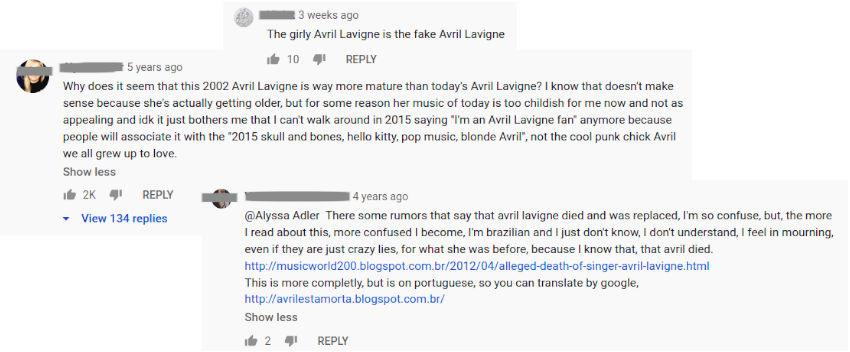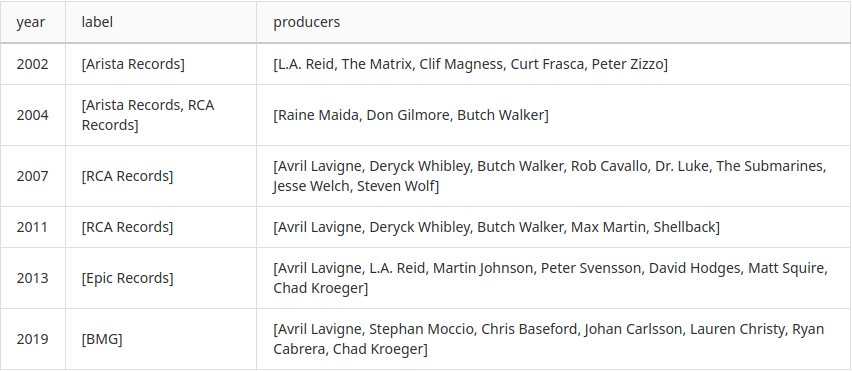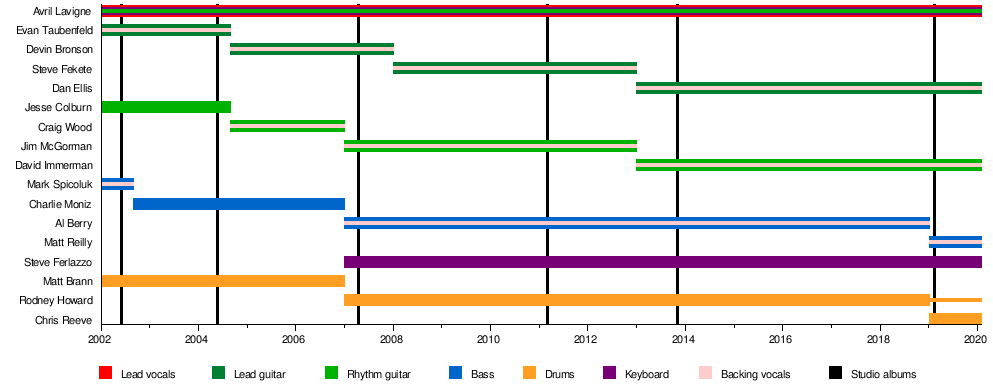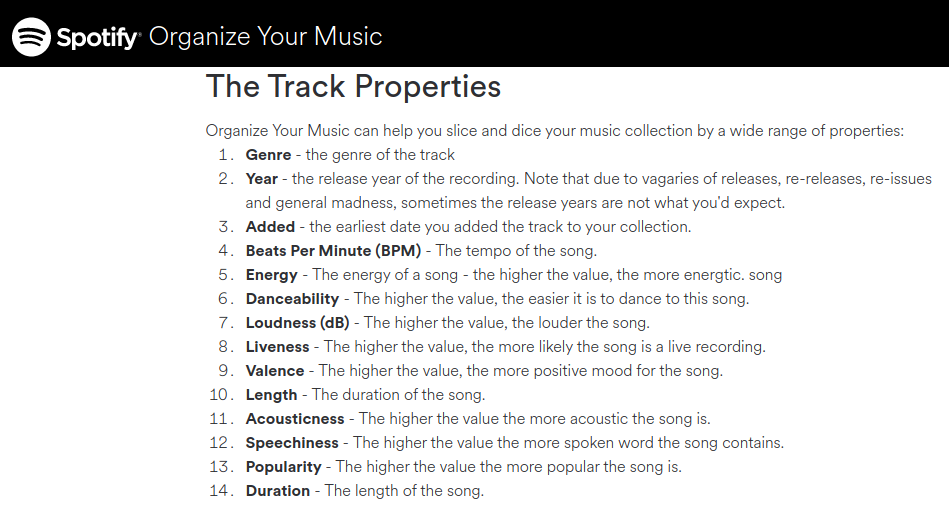Letting go of early 2000's Avril Lavigne
by Éléonore Mayola using Mural
Hey, I'm Éléonore Mayola coming to you with a crucial investigation into what happened to Avril Lavigne in the early 2000's!
This announcement might surprise you if, unlike me, you haven't wandered down the comments under one of her early YouTube videos.
That's where I discovered a specific group of Lavigne fans are convinced she passed away in 2003 and was replaced by a lookalike [1,2].

It is a fact that Avril Lavigne changed in both her music and style, but who doesn't change over time. The explanation behind that transformation is unlikely to be so dramatic, but what happened?

While it is tricky to account for her personal /internal evolution, some of her musical transformations (support band, producers, music) can be looked at to find correlations.
About Avril Lavigne studio albums
The studio albums' global sales decreased and their US chart debut (Billboard 200) worsened over time.
Globally the first three albums did very well, but it seems to go downhill from the fourth album (Goodbye Lullaby, 2011).

Avril Lavigne has frequently changed producers and labels. And she started producing for her third album in 2007.
My musical knowledge is actually very limited (oops, maybe I should have started with this info). However my eyes were attracted by two names. I note that Max Martin, a producer famous for pop music hits like Britney Spear's "Baby One More Time" was involved in the fourth album, when the sales started to tank (compared to the previous albums). Also Deryck Whibley. I like Sum41 including the song "God Save Us All (Death to POP)" (2016) where he states "I don't think you feel anything with pop". I find it ironic that he worked on Avril Lavigne's albums number 3 and 4 which mark this turn away from alternative rock and/or pop punk towards more pop songs.

The composition of Avril Lavigne's support band changed quite a lot.
- 2nd album (2004): 1 new musician (since the previous album)
- 3rd album (2007): 6 new musicians
- 4th album (2011): 1 new musician
- 5th album (2013): 2 new musicians
- 6th album (2019): 2 new musicians
There is no one left from the original band, they stayed for the first or two first albums.
The third album has the most new band members.
A look at Avril Lavigne's songs
I used "Organise Your Music" project by @Palmere to analyse all songs from Avril Lavigne's studio albums. [6] I used an open playlist you might already be listening to while you read (if not, look at the top right corner for the Spotify player or the menu icon of you're on mobile).

Musically, there are a lot of similarities overall. Using songs from an open Spotify playlist [6] shows differences in energy and acousticness. The energy of her albums increased until the third album and then decreased. The songs are also more and more acoustic as time goes by. In terms of lyrics, the third, fifth and sixth albums seem to have more word content that the first, second and fourth albums.
Albums 1, 2, 3: more energetic songs
Albums 4, 5, 6: more acoustic songs
Albums 3, 5, 6: more lyrics
A bit of industry context
More energetic songs and higher sales for the 3 first albums, despite the band musicians high turnover. Then more accoustic songs and introducing a big pop music producer at the fourth album. A lot of the changes seem to have happened between 2007 and 2011 rather than in 2003 (yeah, sorry I'm referencing this conspiracy theory again).
It's very tempting to think Avril Lavigne changed (potentially under external pressures) to mimic other young women artists and cater to a wider audience.
Let's look at a few other solo women singers of the early 2000s and how well they fared in terms of album sales.
In 2002 Avril Lavigne started her career with high record sales in comparison to other solo women artists of the early 2000's like Britney Spears and Christina Aguilera. Those two artists have been very feminine (and sexualised) pop stars from the beginning of their singing career which didn't prevent their sales to also go down. It doesn't seem that pop music associated with a more feminine style would actually be a good strategy for reaching increasing sales and popularity.
This could be different past 2014 when popularity became synonymous with creating a following on social media platforms and would rely even more on the artists appearance and (life)style.
Note: I've only looked at data for album sales and not album downloads which could affect this analysis especially for music after 2007.
Avril Lavigne's albums popularity decreased especially after the 3rd album. This third album seems different in its content (more energy, more speechiness) and has songs viewed as part of a style called "Bubblegum Pop" and the first time Avril Lavigne produces songs. It was made after she left Arista Records, and after the biggest musicians turnover in her backing band.
While her style (hair, clothes) started to change slowly between the two first albums (released in 2002 and 2004), which is consistent with her leaving teenagehood, her biggest musical change happened on or after the third album (2007).
I was a teenager who bought Avril Lavigne's two first albums and felt something was a bit off when "Girlfriend" (first single from the third album) came out.
I lost track of her music and later when seeing a glimpse of a new music video I would think she had become less authentic and closer to what she critised in her early songs "I see the way you're acting like you're somebody else, gets me frustrated". I would attribute this new style to mimicing pop stars to try and attract a wider public. Now I don't think this even makes sense strategically.
What if it's hard to stand out in the music industry while being popular, coming of age in Los Angeles (after leaving a small town behind) and creating music without repeating what you did before.
So what if at a point in our youth we identified with someone's music, they don't owe us anything. Let's just close the door on our early 2000's experience and be fine with not knowing the full story. "There is more that meets the eye, I see the soul that is inside." - Avril Lavigne, Sk8er boi (Let Go, 2002)
References
- Repository with the data, analysis...
- Try Mural
Conspiracy
- [1] https://www.theguardian.com/lifeandstyle/shortcuts/2017/may/15/avril-lavigne-melissa-cloning-conspiracy-theories
- [2] https://avrilestamorta.blogspot.com/
Data for analysis
- [3] https://en.wikipedia.org/wiki/Avril_Lavigne
- [4] https://en.wikipedia.org/wiki/Avril_Lavigne_discography
- [5] https://chartmasters.org/2018/02/cspc-avril-lavigne-popularity-analysis/9/
- [6] open Spotify playlist with all songs from studio recorded albums: https://open.spotify.com/playlist/1cVKLVWEFN2Be7tTA13qUj analyzed using https://organizeyourmusic.playlistmachinery.com (Powered by Spotify. Created by @plamere at The Science of Mu)
- [7] Global sales for each studio album of popular solo women artists between 2000 and 2015. Data from https://chartmasters.org/ - Note: I took the liberty to limit the the plot to 6 artists for readability.
Other
- [8] photos: https://avrillavigne.com/music/
- MTV docu, 2007: https://www.youtube.com/watch?v=f8GLe10jLSw

